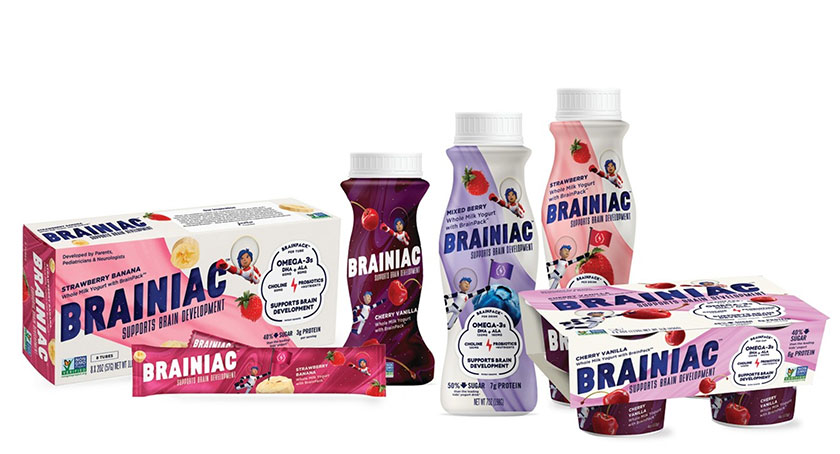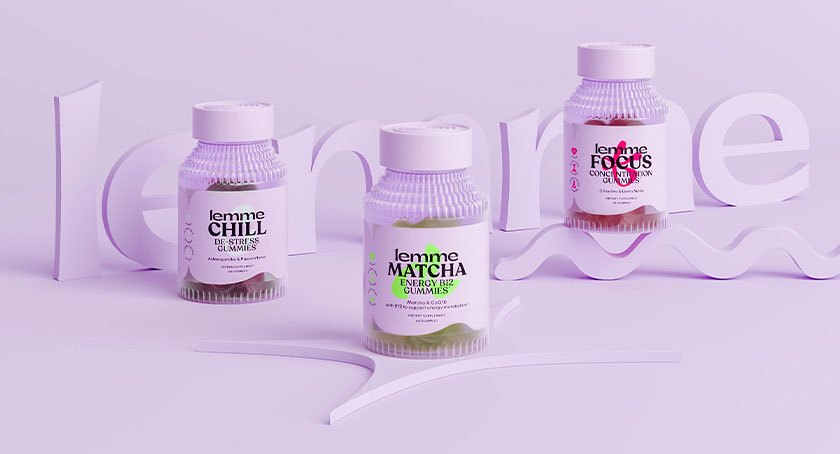Features
Cognitive Health Performance for Today, and Clarity Over a Lifetime
The market for nutraceuticals to support cognition has grown substantially, evolving to meet more personalized and well-defined health needs.

By: Mike Montemarano

After historically focusing on age-related decline, the cognitive support category of nutritional products has evolved to address a wider variety of needs for people of all ages.
“Cognitive health has evolved so much over the past two decades with dietary supplements and ingredients playing an important role in supporting brain function, memory, focus, and overall wellbeing,”said Elyse Lovett, founder of Lovett Marketing & Advertising. “We have seen so many advancements in research that have led to a slew of nootropic ingredients, such as adaptogens and herbal extracts that target specific cognitive pathways.”
Market Outlook
Because of overlap between cognitive health and stress/mood support markets, estimates of the category’s overall size vary. Grand View Research estimated the brain health supplements market has reached $8.63 billion, with projections that the category will grow at a 13.3% CAGR over a period ending in 2030.Today, the cognitive support supplements market is becoming segmented, geared toward performance or prevention.
“‘Healthy agers’ [are] seeking to maintain cognitive health and prevent decline,” said Denis Almonti, director of U.S. nutrition at MayPro. “Younger, driven, health-conscious consumers [are] motivated to supplement for cognitive health by their high-stress lifestyles and an achievement mindset. They need a product that creates a high-perceptual experience.”
Despite these age-based preferences, plenty of ingredients that don’t fit neatly into the “performance” or “prevention” box are still selling well.
“Nammex is seeing high demand for lion’s mane in the cognitive support category,” said Skye Chilton, CEO of Nammex. “With some supplements, you see demand concentrated in one demographic, but lion’s mane appeals to all ages … There’s a wide age range in people seeking supplements to help with brain fog, which is often stress-related, and these continue to be very stressful times.”
Compared to other health benefits, improved global cognition is hard to measure. However, “people can tell if a product is working for them or not,” Chilton noted.
“A lot has changed in recent years,” he added. “Sometimes category evolution is driven by a growing body of research, and other times by current events. One of the biggest-growth categories to come out of the pandemic was products to help manage stress, which impacts cognition, so we’re seeing products targeting stress and cognition, marketed to the general population for everyday use. Some brands specifically target gamers and athletes looking for a mental edge, and often refer to their products as nootropics.”
As many developing brands capitalize on the rapid growth of cognitive supplements, especially in times of inflation, extra caution needs to be taken not to jeopardize the credibility or quality of products in this category.
“So much competition on price both in the ingredient space and in the finished product space can jeopardize consumers being provided with an effective dose. To ensure the longevity of this product category, it’s important to earn trust in the products,” said Chilton.
With increasing expectations about what cognitive health products can offer, manufacturers often turn to multi-ingredient formulations to support a wider and more well-rounded range of health claims than what can be achieved with a single ingredient.
For instance, Lemme, a Kourtney Kardashian Barker-founded supplement brand, recently launched a line of gummy supplements, with Lemme Focus among them. The formula combines Cognizin Citicoline with organic lion’s mane, MCT oil, and vitamin B12, which combined may offer both acute and long-term cognitive benefits.
Lovett noted that, more broadly, the nutraceutical industry has been seeking to address knowledge gaps surrounding women’s unique health needs, and better substantiate products marketed toward women. Menopause, especially, is an important life stage to consider in this regard. “Some key ingredients with strong clinical backing that have gained attention to support women’s cognitive health include Shatavari (aspurūs) from Waleria Health, Cognizin Citicoline from Kyowa Hakko, and KSM-66 Ashwagandha. Other well-known ingredients in the area include omega-3 fatty acids, particularly DHA, Bacopa monnieri, and phosphatidylserine. “

Brainiac Foods children’s yogurts contain omega-3s and choline to support brain development.
Consumer Trends
The connection between mood, sleep, and cognition continues to influence today’s product trends.“One in four Americans is struggling to some extent with their mental health, with consumers seeing elevated rates of stress, anxiety, burnout, and mental fatigue,” said Ashley de Hechavaria, health and wellness analyst at Mintel.
Especially as consumers make trade-offs due to inflation, “brands will need to better understand their customers’ needs and behaviors to create ultra-relevant offerings that drive value, otherwise risking appealing to no one at all,” Mintel reported.
Consumers’ stress comes from financial situations (48%), worrying about the future (48%), personal relationships (42%), work (39%), household responsibilities (36%), and poor physical health (34%), Mintel reported, recommending that wellness brands keep their solutions simple for an audience that has put their mental health on the back burner.
Millennials and Gen Z are especially receptive to cognitive/mental wellness claims. Mintel noted that 44% of Gen Z and 43% of Millennials either currently use or have an interest in supplements with mental/emotional health positionings, while 23% of Gen Z and 27% of Millennials are using or receptive to supplements with claims specific to cognitive function.
“Today’s cognitive health supplements are designed to not only enhance memory and focus, but also support emotional balance,” said Lovett. “Ingredients like Rhodiola rosea, L-theanine, and magnesium are ingredients that have been clinically studied to support mood, stress, and relaxation without causing drowsiness.”
The nutrition industry is challenged to more effectively articulate cognitive health outcomes in the burgeoning field of nutritional psychology.
“Claims have evolved to include such factors as increased mental acuity, relaxation without drowsiness, and, because being tired impacts brain function, improved sleep quality. All of these are associated with a real increase in our ability to function effectively,” said Cal Bewicke, CEO of Ethical Naturals, Inc.
A study published this summer in Nutrients sought to define the cognitive health benefits consumers are seeking from their nutraceuticals. In total, 1,179 people who reported using nutrition to support cognitive health took part in focus groups on the topic. Researchers then reviewed whether established testing protocols aligned with the benefits that consumers desire. The experts agreed that, for certain benefits like focused attention, sustained attention, episodic memory, energy levels, and anxiety, validated tests exist to evaluate the performance of nutraceuticals.
However, for prospective memory (remembering to do things in the future), flow (being able to pay attention to a task effortlessly) and presence, there are no validated tests or tools to be used in nutrition studies. Findings such as these “can be leveraged to better understand the relevance of cognitive assessment tools to everyday life, support the scientific substantiation of consumer benefits, and enhance understanding of what can be delivered,” the authors wrote.

Lemme’s energy, mood, and cognitive support gummies offer short- and long-term cognitive benefits.
Back to Basics
Novel dietary ingredients aside, most people have glaring nutritional gaps to address to better support cognitive health.In May, wellness-focused data company SPINS published a report highlighting what it described as “holy grail” supplements, which were largely made up of essential nutrients whose cognitive health benefits are generating buzz.
Magnesium supplements soared, increasing $322 million in sales, amounting to a 44.5% year-over-year gain. Magnesium supplements positioned for mood support (+20%) and cognitive health (+61%) performed especially well, the company noted. Sales of magnesium threonate, a form associated with brain benefits, rose by 49.3% in the past year.
SPINS attributed a 95.5% sales increase in creatine supplements to “growing interest in its cognitive and mood support properties,” noting that, even among sports nutrition products, cognitive support claims are proliferating alongside the more traditional marketing for muscle health and performance.
SPINS also noted substantial attention that omega-3 fatty acids have garnered for their cognitive health benefits. As evidence on the role of EPA and DHA in cognitive development grows, “brands like Brainiac and Ripple Kids are tapping into this demand, offering innovative solutions aimed at supporting brain development and function from an early age.” Baby and toddler foods containing EPA and DHA have grown 50.6% in one year, according to SPINS.
Research continues to identify how poor overall nutrition can have an adverse role in brain health outcomes.
An observational study published in Neurology found that, in a population of 14,000 people, ultra-processed food intake was associated with significantly increased dementia and stroke risk, while diets indexed as healthier offered protective effects in the aging brain.
An analysis of data from the National Health and Nutrition Examination Survey (NHANES) concluded that higher intake of several nutrients was associated with higher measures of cognitive elasticity in people over the age of 65. The nutrients with the strongest and most consistent associations with better outcomes in cognitive function testing and depression scores were vitamins K, A, and B6, folate, lutein, zeaxanthin, and several minerals.
“Some brands talk about lifestyle changes alongside describing their products for a more comprehensive approach to brain health support. People wanting that extra edge or who are looking to address additional issues where standard health protocols have not helped them enough may turn to supplements,” said Chilton.
Steve Fink, vice president of marketing at PLT Health Solutions, noted that branded ingredients often feature the highest-quality clinical substantiation, covering the most specific health benefits, compared to commodity ingredients, which often rely on more generalized, “shared” science.
These ingredients help consumer product companies “develop compelling, front-of-pack messaging that has impact with consumers and that they can trust,” Fink said, with important endpoints built into study design that have specific demographics in mind.
“Manufacturers should consider ‘next-gen’ versions of these ingredients such as the more bioavailable encapsulated Sucrosomial Magnesium instead of magnesium oxide,” said Almonti.

The Peak of Performance
Adults navigating fast-paced, round-the-clock modern lifestyles, are seeking out supplements to help them overcome stress and burnout, and perform at their best.Younger consumers “favor products that contain nutraceutical ingredients considered new, innovative, and clinically researched. They aren’t supplementing for ‘someday, maybe.’ They want an immediate cognitive boost that is going to improve their daily life,” said Almonti.
“We have been focusing on what we consider to be an underserved demographic, the 18-54 range,” said Fink. “We see intense interest in issues such as peak performance, wellbeing, stress reduction, and quality of life. The market opportunity with this group is massive. Peak performers, including knowledge workers and students, make up 40% of the U.S. population and growing.”
Peak performers desire ingredients that are fast-acting and experiential, with low, once-a-day doses, Fink added. “We have introduced two new ingredients into the space this year alone: Vanizem for mood and sleep, and Serezin for improved quality of sleep and less nighttime pain. To be successful, we need to meet consumers where they are by creating the right ingredients: fast acting; backed by quality clinical science; and convenient doses and delivery systems.”
The emerging demographic of gamers seeking supplements for mental performance will drive brands to innovate with products that have faster results, and market with more of an edge, said Chilton.
It can help to have hard biometric data backing cognitive function claims, especially those oriented around immediate performance benefits.
“Published clinical studies with AlphaWave using electroencephalography (EEG) have shown its ability to significantly increase alpha brainwave activity,” said Bewicke. “This is significant because research shows that alpha brainwaves play a role in a variety of cognitive processes, including attention, memory, and creativity. Higher levels of frontal region and whole-scalp alpha power have also been linked to reduced anxiety and stress.”
Plenty of cognitive health supplements exemplify the shift toward performance positionings.
Brain health supplement brand Neuriva, for instance, launched a 30-Day Brain Health Challenge, offering consumers a series of assessments and games through its app in order to evaluate how supplementation impacts performance in memory, learning, focus, reasoning, accuracy, concentration, and mental alertness tests. Neuriva also provides users with a brain age, cognitive score, and tips and tools for lifestyle changes that could better support cognitive health.
“We know that consumers are looking for simple ways to incorporate healthy and helpful habits into their routine, and when it comes to brain health, we know the potential and power of challenging our brains on a daily basis,” said Mark Pearson, vice president of marketing health at Reckitt, which owns the Neuriva brand.
Young adults are drinking less alcohol than previous generations, offering opportunities for “mocktails” with health benefits. Do’Mo recently launched a line of zero-proof beverages in spicy watermelon margarita, berry bramble, and ginger miso mule flavors; each formula contains Cognizin Citicoline, along with 17 other functional ingredients like amino acids.
Between the popularity of esports, and the modern workplace involving prolonged screen time, supplement makers are “all-in” on cognitive health solutions that promise resilience in the face of digital eye strain, information overload, and overstimulation.
AdvoCare International, LLC recently launched a brain, eye, and sleep support supplement called Blue Orbit, formulated to counteract the effects of screen time and stress. The formulation features Lutemax 2020, a branded formulation of lutein and zeaxanthin, along with vitamins C and E, zinc, and copper, each of which have respective eye and brain health benefits.
Aging with Clarity
Baby Boomers concerned about age-related cognitive decline will continue to make up a substantial portion of this market segment. Meanwhile, younger consumers are becoming more proactive about cognitive health at an earlier point in life than prior generations.Compared to younger consumers seeking performance-based benefits right away, “older consumers, who were once the primary market for cognitive support products, are being proactive. They are hoping to keep their minds sharp as they age, and are comfortable waiting longer to experience benefits,” noted Chilton.
Well-established products continue to win big with older audiences, said Bewicke. “For decades, older people have turned to natural products such as Ginkgo biloba extract to preserve memory and cognitive function. Younger people don’t need to be so concerned about memory loss,” he said.
Many older consumers are interested in established botanical products they can take for the long haul. PLT’s flagship cognitive support ingredient Nutricog is a unique combination of Haritaki and Boswellia extracts standardized to gallic acid, ellagic acid, and amyrins, and has been studied across a battery of cognitive tests.
In a clinical study of 100 healthy men and women between the ages of 40 and 65, a 120-day treatment with Nutricog was linked to significant improvements in learning, memory, attention, focus, concentration, clarity, executive function, and increased cognitive speed with no reduction of accuracy.
Several high-impact studies on nutraceuticals and cognitive aging have been published in the past few years.
For instance, researchers are still rolling out findings from the large-scale COSMOS (Cocoa Supplement and Multivitamin Outcomes Study) trial, which enrolled over 21,000 older men and women over a 3-year period. This year, researchers found significant associations between multivitamin use and cognitive test scores in the full population of adults, and between cocoa flavanols and cognitive performance improvements in people whose diet quality was poor at baseline.
Meanwhile, the gut microbiome’s role in preserving cognitive function amid age-related declines is a hot research topic.
A study published in Nature Communications found that 12 weeks of supplementation with a prebiotic fiber supplement, on top of a resistance exercise and BCAA supplement prescribed to all participants, significantly improved CANTAB cognitive test scores. “Here, we report a correlation between increases in the cognitive factor score and the relative abundance of Actinobacteria at the study end, even after adjusting for baseline abundance, study arm, and twin pairing,” the authors concluded.
Most evidence supporting omega-3s in cognitive health is related to pre- and postnatal early life development. However, a study published in JAMA Network Open found that, in 102 adults over the age of 75 who had relatively low blood levels of omega-3s, 3 years of supplementation with EPA and DHA significantly reduced white matter lesions in brain scans among carriers of the APOE4 gene, a marker of Alzheimer’s disease susceptibility.
Emerging Benefits
Researchers are assessing how personalized nutrition interventions can benefit people with Autism Spectrum Disorder (ASD) and other cognitive conditions.Probiotic brand Floré launched two supplements formulated to improve GI discomfort in people with ASD, alongside symptoms related to ASD involving language, comprehension, cognition, thinking, and speech. The two products are based on a precision prebiotic formulation that was tested over 3 months in 296 children and adults diagnosed with ASD, against a control group. Pathways Support was formulated to support metabolic function, boost thiamine, reduce harmful bacteria, and improve GABA levels for neurodiverse individuals or those with ASD, while Mood Support was formulated to support mood and overall mental wellbeing in the same population.
“We are seeing a focus on bioavailability and the microbiome, how an ingredient can leverage the gut-brain axis to benefit cognition,” said Almonti. “For example, EubioQuercetin is a 100% natural, water-soluble, and highly bioavailable quercetin formula that reaches the colon to leverage the gut-brain axis.” In a soon-to-be-published study, the ingredient had a combined positive impact on gut microflora and neuroprotective properties, Almonti said.
About the Author: Mike Montemarano has been the associate editor of Nutraceuticals World since 2020. He can be reached at mmontemarano@rodmanmedia.com.



















